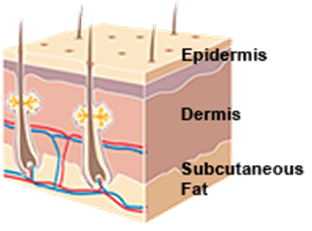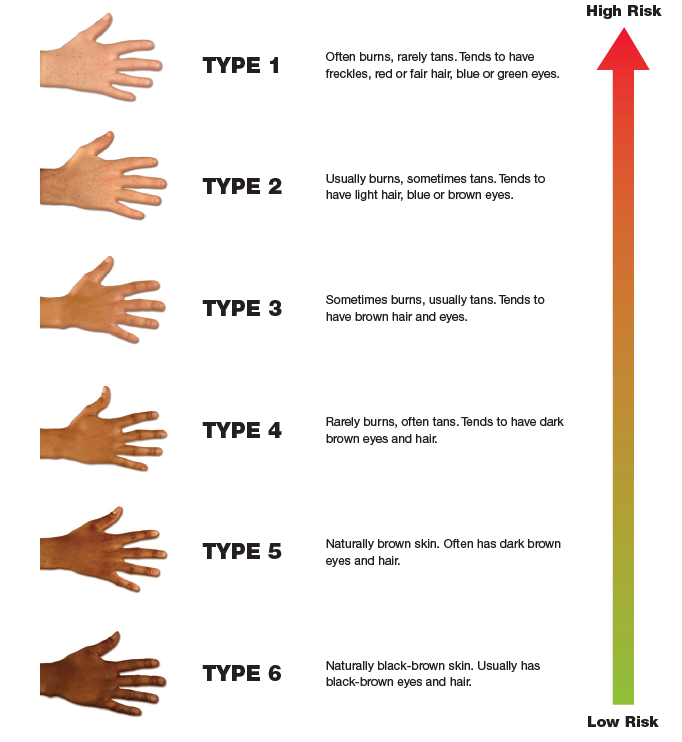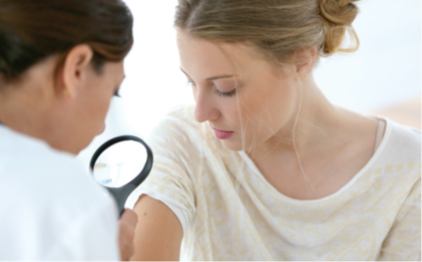Skin Cancer
What is Cancer?
The body is made up from millions of cells that are constantly dying and being replaced. Normally, cells divide in an orderly and controlled way. Cancer occurs when a cell divides and multiplies too rapidly. This produces a lump of abnormal cells known as a tumour. Tumours are either benign (non-cancerous) or malignant (cancerous). There are 200 different types of cancer and early detection can greatly increase the chances for successful treatment.
The skin is a body organ. It does several important jobs, such as being a barrier and protecting everything inside your body. The skin is divided into two main layers. The outer layer is the epidermis and the layer underneath is the dermis. Below these is a deeper layer of fatty tissue.

Skin Cancer
What causes skin cancer?
Most skin cancers are caused by exposure to UV rays from the sun and risk is especially high if you had several episodes of sunburn in childhood.
The World Health Organisation developed a Solar UV index (from 0 to 11+), which helps us know when we are exposed to harmful levels so we know when we need to be protecting our skin.
In NI, we regularly see levels of 3 or more from April and our weather forecasts usually include some information about the UV levels so we know when we are at increased risk of exposure to these harmful rays. It’s not just if we go abroad to sunnier climates.

What causes skin cancer?
Know your skin
The risk of damage to your skin can also depend on your skin type
Not everyone’s skin reacts in the same way to the sun. Knowing your skin type is important in reducing your risk of sunburn and skin damage.

Know your skin
Skin Cancer Risk Factors
People with certain risk factors are more likely than others to develop skin cancer. Risk factors vary for different types of skin cancer, but some general risk factors are:
- Sunburn – UV exposure is the main preventable cause of skin cancer.
- Skin Colour/type (see skin type guide)
- Number of Moles
- Family History
- Previous skin cancer
- Sunbed use
- Age – risk increases with age
Skin Cancer Risk Factors
Types of skin cancer
There are two main types of skin cancer. Melanoma and non-melanoma skin cancer.
Non-melanoma skin cancer is the most common type of skin cancer diagnosed in the UK each year.
The two main types of non-melanoma skin cancer are-
- Basal cell carcinoma
- Squamous cell carcinoma.
Malignant melanoma is less common and needs to be treated as early as possible because it can grow quickly.
Types of skin cancer
Symptoms of Skin Cancer
The symptoms of melanoma and non-melanoma skin cancer differ, so it’s important to know what to be aware of for each.
Non-melanoma occurs most commonly on skin that is exposed to the sun and symptoms can be similar to non-cancerous skin conditions.
- Spot or sore that does not heal within 4 weeks
- A sport or sore that continues to hurt, scab, bleed or itch for over 4 weeks
- Areas of skin that have broken down or formed an ulcer without cause and does not heal within 4 weeks.

Symptoms of Skin Cancer
Melanoma skin cancer most commonly occurs on a mole and there are definite signs which should be investigated by a doctor. Look out for changes in moles, including:
- Change in size
- Change in colour – darker, patchy or multiple shades
- Change in shape or loss of symmetry
- Itching or pain
- Inflammation
- Bleeding or crusting
Any of these symptoms should be checked by your GP.
Get into the habit of checking your skin once a month, so you know when something might have changed.
IF IN DOUBT CHECK IT OUT
Melanoma

Skin cancer prevention
It is important to know that we can prevent many skin cancers by simply protecting our skin.
Most people think you will get skin cancer as a result of being burnt abroad but it is also general exposure to our daily climate that is causing the problem.
Here is some information on how to protect your skin:
Remember the 5 tips for sun safety: Slip, slop, slap, seek, slide.
- Slip on a t-shirt. Covering up areas such as shoulders and back which burn easily is one of the most effective ways to avoid sunburn.
- Slop on sun cream, ensure this offers UVA and UVB protection.
- Slap on a hat to protect face, ears and neck as these areas are exposed to the sun and easily burnt.
- Seek shade or stay indoors between 11am and 3pm as this is when the sun is at its strongest.
- Slide on sunglasses. When choosing sun glasses look for the ‘CE Mark’ and British Standard (BS EN 1836:1997) which indicates a safe level of protection.
- 100% UV protection and UV absorption up to 400nm.
- Sun glasses should also screen out 75-95% light.
Tip: if you look in a mirror and can see your eyes through the lenses they are probably allowing in too much light.

Skin Cancer Prevention
Know your SUN CREAM
There are a lot of options in the shops for sun creams and some offer better protection than others. Here are some useful tips on how to choose the best sun cream for you:
- SPF: (Sun protection factor) tells you the amount of protection against UVB rays. The higher the SPF the greater the protection. Always choose a sun cream with SPF15 or higher, regardless of skin type. Less than SPF 15 means you are not getting enough protection from UVB rays.
- Star ratings: The star rating system indicates the amount of protection against UVA rays. Many people don’t know about the star rating, so it’s always good to look for this too – it can be on the front or back of products. The higher the star rating the more protection offered.
- Apply sun cream at least 20 minutes before going out in the sun and keep topping up throughout the day. Reapply all sun creams every 2 hours.
- Remember to protect your lips using a lip balm containing spf.
Never use sunbeds. UV rays from sunbeds can be 10 times stronger than the midday sun.


Know your Sun Cream
Action Cancer provides…
Early Detection
Breast screening services and health checks available from the Big Bus and Action Cancer House in Belfast.
Support Services
Complementary therapy, acupuncture, counselling, life coaching, peer mentoring; and our Positive Living Programmes are available for those impacted by cancer in order to enhance quality of life and learn coping strategies.
Education
As a local charity with a focus on cancer awareness, prevention and detection the health promotion team deliver a range of services and programmes to schools, communities and workplaces across Northern Ireland.
